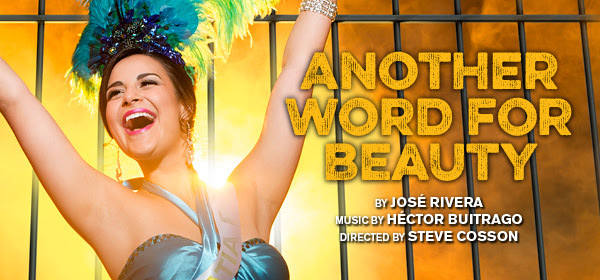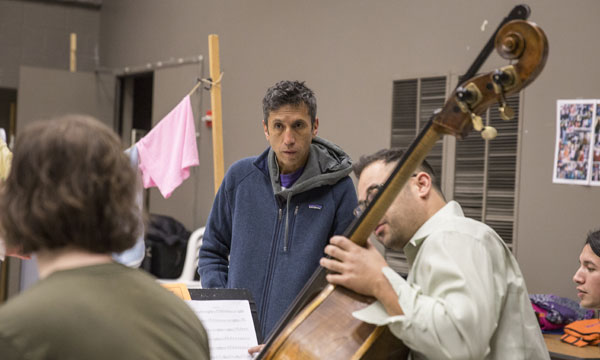The Goodman Gives Us ‘Another Word For Beauty’
By Jim DeRogatis

The Goodman Gives Us ‘Another Word For Beauty’
By Jim DeRogatis
Renowned Colombian songwriter Hector Buitrago has made a career of tearing down walls—between different styles of music (from the punk rock and heavy metal that inspired him as a teen, to the indigenous folk genres of his homeland), as well as between the music world and activists for a range of political causes. No one familiar with his work with Aterciopelados, the groundbreaking band he led with singer Andrea Echeverri through the ’90s and 2000s, was surprised when he named his solo project “ConEctor,” playing on both the Spanish words “con Héctor” and the English “connector.” So, despite his lack of experience in the theater, it seemed natural that he was eager to take part in the Goodman’s production of Another Word for Beauty, collaborating with playwright José Rivera, director Steve Cosson, and the many others involved onstage and behind the scenes for the most ambitious joint project yet by U.S. and Colombian artists.
“It was very different for me to work with so many different pieces of the puzzle,” Buitrago said from his home in Colombia. “I had to imagine that there were things in the future with the actors, with the design, and that was difficult.”
Indeed, Buitrago was still composing new songs in November, finishing a process that had begun more than three years earlier.
“Now I’m so excited to see how it all comes together. The music was prepared with a lot of anticipation, but the music is just one part of the play—though an important part, I hope!”
Writing lyrics in Spanish based on his reading of the script, Buitrago worked with the music to capture an ambience he described as “surreal, like if you’re having a dream.” He prepared by visiting El Buen Pastor Women’s Prison, the national women’s prison in Bogotá where the play is set.
“I tried to capture the feelings I had when I visited the jail. I was there for the pageant, and there are a lot of strong feelings when you stand there. The pageant is a really happy moment for the women, but when everything is ending, the feeling is so strong—it’s going back to reality. I spoke a lot with Steve and José about that when I started to compose the music, and I tried to incorporate their feelings and comments, too.”
Although it takes on new meaning behind bars, the beauty pageant is a major facet of Colombian culture, and one that Buitrago knows well.
“In Colombia there is a pageant for everything—a pageant for coffee, a pageant for the forest, every city and every little village has a pageant,” he said, laughing. “In the jail, it’s the same. All the women are representing the places where they were born, and they are so proud of that. In that pageant, they find a very happy moment. It’s a moment of happiness, of freedom, of beauty—a very strong moment for the women.”
Buitrago is a self-taught musician. “I didn’t know how to play an instrument, but with punk music and its attitude of ‘do it yourself,’ I started to learn bass and formed a band.” That group, Aterciopelados or “the Velvety Ones,” was wildly ambitious. “We really liked punk and New Wave, electronic music also, and of course the music from Colombia and Latin America. We wanted to put all the ingredients together to sound fresh and organic, but in an authentic, Colombian way—to build a new genre, a new music called Colombian rock.” With the band, his solo work with ConEctor, and in the music for Another Word for Beauty, the artist has succeeded, though commercial accomplishments always seemed less important than social activism.
“When we were a very famous band, when we started touring and all of that, we listened to the voices that said to us that we must use that power to communicate things that were important to the community, to the country, and to the people who listen to our music. Andrea and me chose different ways of being active with the music—Andrea with the women things, the women activism, and me with ecological and indigenous issues. Though I always also was very interested in the women and feminine power. I think that the masculine power, the patriarchal society, is the cause of many of the problems of humanity. The masculine power that is in charge of everything—it would be a better world if women were in charge!”
Given his passion for the connection between art and activism, one can’t help but ask about the message that Buitrago hopes theatergoers will take away from Another Word for Beauty, and whether the play might be a catalyst for change.
“I don’t know about change,” he said after a long pause. “But it’s a cause for reflection on many issues—about women, and about men, because a lot the women are in jail because of men. The reality of our country is that those women are in jail because of the war on drugs, and a lot of people have died because of the war on drugs. The U.S. has a lot to do with that war. Colombia receives money from the U.S. for the war on drugs, but it’s not as simple as the U.S. needs to stop meddling. Nothing is simple. In the end, I hope people will think about women, think about countries like Colombia, think about the situation between the U.S. and Latin America, and think about the music and the people.”

I am proud to say this piece is featured in the program for the Goodman production. The show is running now through Feb. 24,and tickets are available here. I will be leading an in-depth conversation about the play with Buitrago, playwright José Rivera, and director Steve Cosson at the theater at 5 p.m. on Sunday, Jan. 24; tickets for that are $10 for the general public; $5 for Subscribers, Donors and students.
Follow me on Twitter @JimDeRogatis, join me on Facebook, and podcast or stream Sound Opinions.

